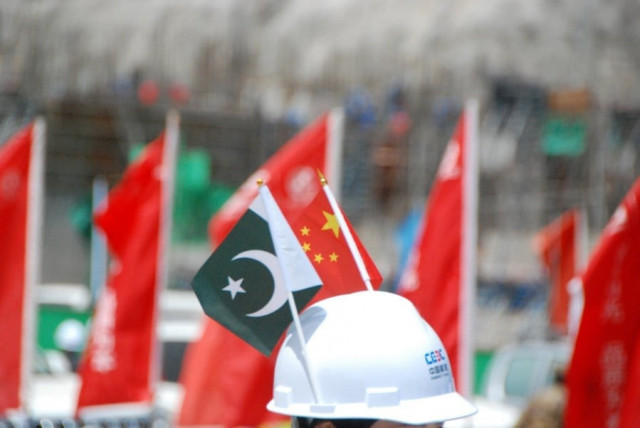Chinese firms not to renegotiate PPAs
Chinese firms reject renegotiation of CPEC power contracts as Pakistan seeks debt relief

As a Pakistani team leaves for Beijing to seek reduction in interest rates and extension in the tenure of the debt taken for China-Pakistan Economic Corridor (CPEC) energy projects and nuclear power plants, Chinese companies have ruled out the possibility of renegotiating the power purchase contracts.
In a background briefing to The Express Tribune, representatives of three large Chinese companies said that the matter of whether to restructure the energy debt should be decided between the Chinese banks and the Pakistani authorities.
However, they ruled out the possibility of renegotiating their own terms and conditions, which were related to their profits and the idle capacity payments, and agreed under the Power Purchase Agreements.
Finance Minister Muhammad Aurangzeb leaves early Wednesday (today) to meet with Chinese authorities to seek an extension in repayment of the debt that the government of Pakistan and the Chinese companies have taken from the Chinese financial institutions for setting up power plants.
Pakistan had taken the debt to set up nuclear power plants, while the Chinese companies took these loans for the power plants setup under the CPEC. A Power Division official said that the estimated value of the outstanding debt was around $17 billion for both nuclear plants and CPEC energy projects.
Pakistan has prepared a proposal for up to 8 years extension in energy debt repayments, changing lending currency from US dollar to the Chinese Yuan and seeking a cut in the interest rates, according to Finance Ministry sources.
If accepted by the Chinese authorities, the cumulative impact of these concessions could be around Rs6 to Rs7 per unit reduction in the prices. Only the impact of the Chinese power plants is Rs3 to Rs4 per unit, the sources said.
Pakistan is seeking conversion of interest instruments from Secured Overnight Financing Rate (SOFR) to Shanghai Interbank Offered Rate (SHIBOR). It is also seeking a cut on the interest spread over and above the SOFR or SHIBOR. This would cumulatively reduce the cost of debt around 5%, the sources added.
Similarly, as against the existing 10 years repayment period, the government is seeking five years to eight years further extension, spreading the cost of debt in the energy tariff over a total period of 18 years.
In this fiscal year, Pakistan is scheduled to make over $2 billion energy debt repayments to Beijing, which it wants to postpone to seek relief amid distress times. Pakistan has also set up the nuclear power plants with the Chinese loans and is seeking the extension.
The government has notified the new average electricity price at Rs33 per unit with effect from July and out of this over Rs18 per unit was on account of idle capacity payments. There is a growing pressure from the industrialists and the residential consumers to avoid these idle capacity payments by reopening the Power Purchase Agreements. However, the government remains the major beneficiary of these idle capacity payments, followed by Chinese plants.
The take or pay condition of the Power Purchase Agreements is based on the 2014 energy policy, which cannot be reopened, said executives from the Sahiwal Power Plant, Port Qasim Power Plant and China-Hubco power plant. The combined capacity of these three plants is 3,960 megawatts and these have been setup under the CPEC umbrella.
Most of the countries buy electricity on take or pay basis and no foreign investor would be interested in setting up power plants in Pakistan on take-and-pay basis, said a Chinese executive.
In case of take or pay, the government has to make payment against the guaranteed capacity, irrespective whether it buys the power or not. However, in the take and pay scenario, the payments are only made against the purchased electricity.
Pakistan should be mindful that 10 years ago there were power outages of 10 to 14 hours a day and even local investors were not investing in the energy sector, according to these executives. "The 2014 power policy is the foundation of our investment in Pakistan", said the Chinese representative from the Port Qasim power plant.
These executives said that the core issue was uncontrolled and high line losses, theft and low recoveries. The Chinese companies should not be blamed for the higher energy prices, as our cost of electricity is still cheaper than the government-owned power plants being run on the LNG, they continued.
According to the plant merit order issued by the government on July 16, the Port Qasim was producing electricity at Rs13.88 per unit, standing 15 at the merit order. The China-Hub power plant was producing electricity at Rs13.93 per unit and was on 16 position at the merit order. The Sahiwal coal power plant was producing power at Rs18.30 per unit and was on 20 in the merit order of total 74 power plants.
The government-owned power plants were producing electricity at over Rs24 per unit, according to the merit order. The Chinese representatives said that the return on equity on the Chinese investment was not more than the prevailing interest rates in Pakistan.
The representatives of the three largest imported-coal based power plants further said that due to Pakistan's foreign currency crisis they could not transfer dividends back home to their parent companies. "Even though we have been paid in the local currency, the money stayed in Pakistan and due to currency depreciation our profits have been eroded," said a senior executive.
"We have been making regular debt payments since the commissioning of the plants and the majority of the debts have already been paid," said an official of the Port Qasim Power Plant of the CPEC, when he was asked to comment on the government's proposal to seek restructuring of the Chinese energy debt.
The companies could not decide about the restructuring of the debt and any such decision had to be taken by the banks and their insurer, the Sinosure, according to a representative of one of the largest Chinese power plants. "It is meaningless whether or not energy companies will agree to any such proposal. The solution does not lie in the renegotiation of the terms of the energy deals."
The Chinese companies have submitted a report to the government on reducing the cost of energy in Pakistan, but there is no development on that, said these executives. The prime minister wanted to improve investment in Pakistan and yet it wanted to reopen 10 years old deals, which would not send a good signal to the Chinese investors, they added.
The companies said that the option of converting the local coal to imported coal could be considered only on the basis of scientific and evidence-based decision making while keeping in mind the financial and commercial viability of these plants. They said that the government was not sharing the complete details of a German consultant study about the conversion of imported coal power plants.
Former interim commerce minister Gohar Ejaz said on Tuesday that the Federation of Pakistan Chambers of Commerce and Industry (FPCCI) would approach the Supreme Court to challenge the agreements with Independent Power Producers (IPPs).
In a tweet, Ejaz said that the FPCCI, representing Pakistan's business community, woul file a formal petition in the apex court with the request of the court's intervention in what Ejaz described as an intolerable situation that affected the right to life of every Pakistani.
However, the Supreme Court's intervention in Reko Diq mining deal had led to imposition of $6 billion penalty on Pakistan and the government eventually begged for an out-of-court settlement.



















COMMENTS
Comments are moderated and generally will be posted if they are on-topic and not abusive.
For more information, please see our Comments FAQ